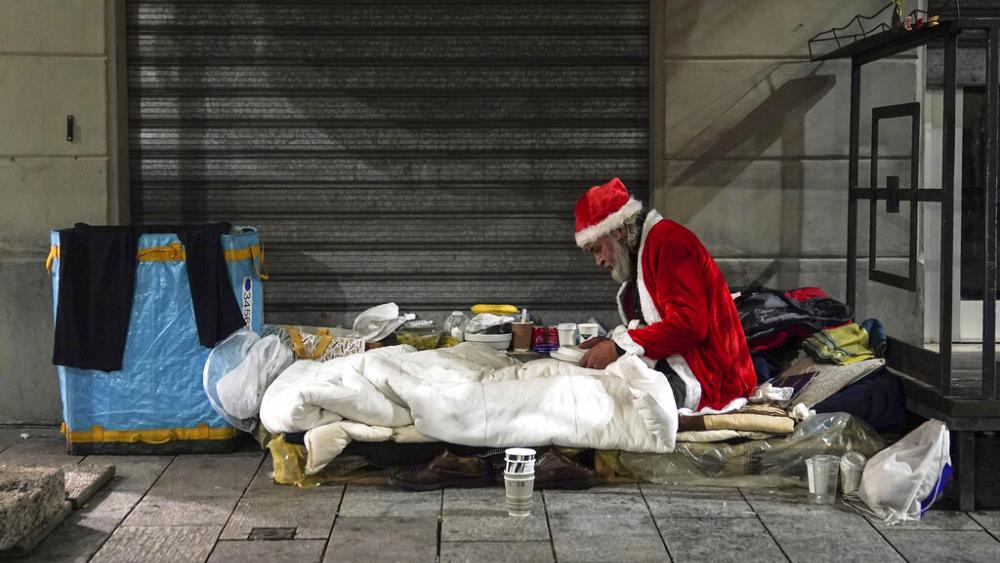
One piece of good news to come out of the coronavirus pandemic was the successful campaigns from some European countries and cities to get vulnerable people off the streets and into accommodation.
In Brussels for example, some 1,000 people were housed in hotels, which had been sitting empty as travel and tourism came to a standstill.
An issue that for years had either been ignored by many politicians or dismissed as too difficult to solve, was seemingly solved in a matter of weeks, suggesting if the political will is there, there is a way.
“If you asked me before the coronavirus hit us ‘is it possible to solve rough sleeping?’ I would have said yes, but it would take years, and we have seen in many countries it has taken weeks to get people off the street,” said Freek Spinnewijn, director of FEANTSA, a European federation of national organisations working with the homeless,
“There are some cities and countries that have taken the occasion of the corona pandemic to rethink their homeless policies.
“A city like Lyon, for instance, has committed to not force people back to [the] streets or shelters but to provide sustainable housing solutions.
“A country like the Netherlands has invested €50m extra for vulnerable groups including homeless people.”
Charities are warning, however, that once the emergency measures put in place to stop the spread of COVID-19 come to an end, the situation could get even worse than before.
‘Our worry is after the pandemic’
There are not just fears that when Europe emerges from the pandemic it will be back to business as usual.
The homeless population in the EU has grown 70% over the last 10 years according to some studies, with around 700,000 people in need of shelter.
The economic damage, lost jobs, and the inevitable drying up of government financial support could see this number grow.
“Our worry is after the pandemic,” Spinnewijn tells Euronews.
“If tourism picks up again, I don’t think the hotels will be keen to keep homeless people as their clients.
“We expect a further increase in homelessness because of the accumulation of rent arrears.
“Many people have not been evicted because of eviction moratoria, but, at some point, that will be lifted and it will create a spike in homelessness.”
While some people have been helped into more secure accommodation during the pandemic, others have been bearing the brunt of the spread of the deadly virus.
Research conducted in October by Medicins sans Frontiers found more than 50% of homeless people tested in emergency shelters in and around Paris currently had, or previously had coronavirus.
The study “identifies overcrowding as the most important factor to explain the variability in exposure rather than reported adherence to the recommended preventive measures,” the report states.
“In the first wave there were infections in shelters, but lower than we feared, a bit higher than infections in the general population,” said Spinnewijn.
“But in the second wave, we’ve seen some countries, some cities where the spread through shelters has been quite high.”
The problem in some places has therefore been compounded by shelters reducing capacity to try to make social distancing measures a possibility.
‘It’s time to look at permanent solutions’
So is the pandemic an opportunity to rethink policy on vulnerable people and housing?
Sarah Coupechoux from Fondation Abbe Pierre says while we wait to see how the situation plays out after the winter, with the rise in people who are going to be unable to pay their rent, now is the time to implement permanent solutions.
“For the moment we are seeing some temporary responses, but we think we need to adopt the housing first model that we see in Finland for example. We know it works, we know people stay in their homes when we adopt this mode,” she tells Euronews.
The Finnish housing first approach was introduced in 2007. Vulnerable people who need housing, are given it and given the responsibility to pay the rent. Finland is the only EU country where the level of homelessness is falling.
“It’s not so many people, and I think we could find a solution if politicians wanted,” Coupechoux added.
The EU has a goal in mind for the issue – eradicating homelessness by 2030.
Both Spinnewijn and Coupechoux are pleased that homelessness is on the European Commission’s agenda, and point to the launch of an action plan next year to deliver on the European Pillar of Social Rights.
“The potential impact of transnational cooperation on homelessness is huge,” said Spinnewijn.
The 2030 goal is ambitious, but Spinnewijn points out that there are “some easy gains that can be made”.
“One of the things that disappeared overnight was the night shelters,” he said, referring to the measures to get homeless people off the streets during the pandemic back in March and April.
“That is a ridiculous system anyway whether there is corona or no corona, but it has stopped and now, all shelters are 24/7. I hope that will stay and that homeless people will not be forced onto the street in the daytime anymore. These are easy wins.”
Related posts:
Views: 0
 RSS Feed
RSS Feed

















 December 23rd, 2020
December 23rd, 2020  Awake Goy
Awake Goy 





 Posted in
Posted in  Tags:
Tags: 
















